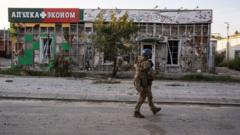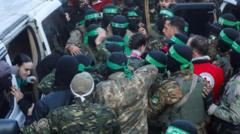In this article, a journalist recounts his experiences during a return trip to Afghanistan, emphasizing the contrasting realities faced by locals and foreign visitors, and the lessons learned from engaging with Taliban members.
Returning to Afghanistan: Unveiling Lessons from the Taliban's Perspective

Returning to Afghanistan: Unveiling Lessons from the Taliban's Perspective
In a rare journey back to Afghanistan, a reporter explores the secrets left by the US withdrawal and the Taliban's enduring presence.
As the bitter winds howled across the snowy mountain pass, a ramshackle trailer served as a temporary outpost, embodying the rugged resilience of its occupants. The Talib in charge, disheveled and suspicious, stood as a stark contrast to the expectations held by foreign correspondents. My colleague Bryan Denton and I found ourselves waiting, seated on the floor of the trailer, as the Talib meticulously examined our documents, surrounded by guards who appeared to be sleeping off the cold.
We explained the purpose of our visit — to explore Afghanistan from a different lens, seeking insights into the legacy left behind by the United States. Most Taliban members we encountered in the capital had been cautiously accommodating, but this particular individual's wariness was palpable, in stark contrast to the more accommodating encounters we'd previously experienced. Tensions rose as the guard began recording us on his phone, igniting an instinctual fear that such documentation could lead to trouble.
As the minutes dragged on, Bryan's worried expression mirrored my own thoughts. Was the cover we had gained through credible sources in Kabul now unraveling? The minutes felt like an eternity, and the frigid air inside the trailer seemed to grow even heavier with uncertainty. We braced ourselves for what could follow, uncertain if we would be allowed to continue our exploration or if this chapter would end in misfortune.
In that moment, I grasped the complexities of reporting from a country still grappling with remnants of war, questioning not only our safety but the broader implications of what this conflict had wrought for those who remained. With every exchange, we aimed to bridge the gap between narratives, seeking understanding amid a landscape unchanged by the passage of foreign time.
We explained the purpose of our visit — to explore Afghanistan from a different lens, seeking insights into the legacy left behind by the United States. Most Taliban members we encountered in the capital had been cautiously accommodating, but this particular individual's wariness was palpable, in stark contrast to the more accommodating encounters we'd previously experienced. Tensions rose as the guard began recording us on his phone, igniting an instinctual fear that such documentation could lead to trouble.
As the minutes dragged on, Bryan's worried expression mirrored my own thoughts. Was the cover we had gained through credible sources in Kabul now unraveling? The minutes felt like an eternity, and the frigid air inside the trailer seemed to grow even heavier with uncertainty. We braced ourselves for what could follow, uncertain if we would be allowed to continue our exploration or if this chapter would end in misfortune.
In that moment, I grasped the complexities of reporting from a country still grappling with remnants of war, questioning not only our safety but the broader implications of what this conflict had wrought for those who remained. With every exchange, we aimed to bridge the gap between narratives, seeking understanding amid a landscape unchanged by the passage of foreign time.






















